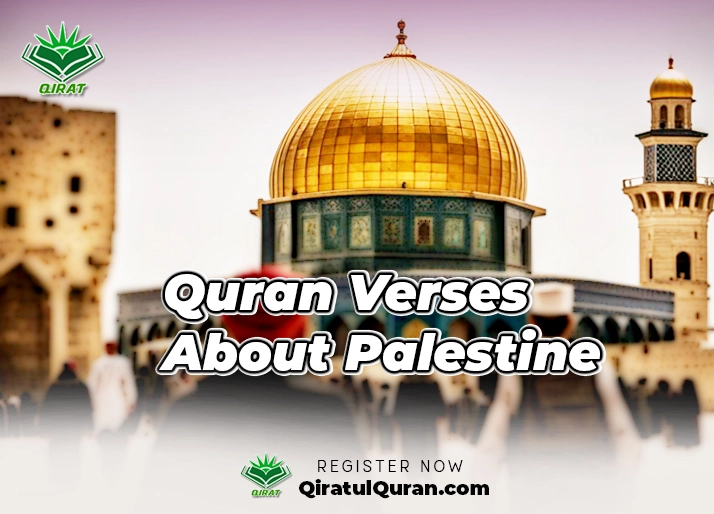
What verses in the Quran talk about Palestine
Quran Verses About Palestine: The Israeli-Palestinian conflict is one of the most protracted and contentious political issues in the modern world. At the heart of the conflict is the land and statehood of Palestine, which has been occupied and contested for decades.
The Quran, the central religious text of Islam, contains several verses that have been interpreted by both Israelis and Palestinians as relating to this conflict. While the Quran does not explicitly mention Palestine by name, some verses discuss the Holy Land more broadly and issues related to justice, oppression, and sovereignty over territory.
Verses on the Holy Land
Several verses in the Quran refer to the Holy Land, its surroundings, and God’s gifts bestowed upon the land. For example:
Al-Ma’idah 5:21
“O my people, enter the Holy Land which Allah has assigned to you and do not turn back [from fighting in Allah ‘s cause] and [thus] become losers.”
This verse encourages the people to enter and take possession of the Holy Land promised to them by God. Some interpret it as a divine command for the Palestinians. As successors of the earlier stewards of the land, to establish control and sovereignty over the territory God has assigned to them.
Al-Isra 17:1
“Exalted is He who took His Servant by night from al-Masjid al-Haram to al-Masjid al- Aqsa, whose surroundings We have blessed, to show him of Our signs. Indeed, He is the Hearing, the Seeing.”
This verse refers to God taking the Prophet Muhammad S.A.W on the Night Journey from Mecca to the “Farthest Mosque”, which is interpreted to refer to the Al-Aqsa mosque in the Old City area of Jerusalem. It suggests God has blessed the land around Jerusalem. Palestinians regard this as legitimizing their claim over Jerusalem and its surroundings.
Al-Anbiya 21:71
And We saved him and Lot to the land which We had blessed for the worlds.
This verse describes God saving Abraham and Lot and taking them to the blessed Holy Land. As descendants of Abraham through his son Ishmail, Palestinians draw upon this verse to assert their hereditary rights to this land as part of God’s promise and blessing.
Verses on Justice and Oppression
The Israeli-Palestinian conflict involves complex disagreements over issues like sovereignty, statehood, security, and mutual recognition. However, at its core is also the fact that the Palestinians regard themselves as unjustly oppressed and denied rights by Israel. Several Quranic verses deal with these themes:
An-Nisa 4:75
“And what is [the matter] with you that you fight not in the cause of Allah and [for] the oppressed among men, women, and children who say, “Our Lord, take us out of this city of oppressive people and appoint for us from Yourself a protector and appoint for us from Yourself a helper?”
This verse calls on believers to fight for the cause of God and to defend the oppressed. Palestinians have used it to characterize their broader struggle as one against an oppressive occupation by Israel. Fighting or violent resistance here is portrayed as justified by the need to end oppression.
Ash-Shura 42:42
“The cause is only against the ones who wrong the people and tyrannize upon the earth without right. Those will have a painful punishment.”
This verse promises punishment for those who oppress others and spread injustice on earth. Along with several others, speeches and writings by Palestinian leaders. They have invoked it to portray resistance against Israeli occupation as a righteous cause sanctioned by God against oppressors and tyrants.
Verses on Justice and Fairness
Beyond liberation and freedom from oppression. Establishing justice is also invoked as an ideal outcome by Palestinians when referring to ending the Israeli occupation. Relevant Quranic verses include:
An-Nahl 16:90
“Indeed, Allah orders justice and good conduct and giving to relatives and forbids immorality and bad conduct and oppression. He admonishes you that perhaps you will be reminded.”
This oft-cited verse establishes justice as a core commandment from God alongside righteous and moral conduct. Palestinians have used it to argue that the establishment of a fair and equitable solution that restores their rights is the ultimate moral and religious imperative.
Al-Hujurat 49:9
“And if two factions among the believers should fight, then make settlement between the two. But if one of them oppresses the other, then fight against the one that oppresses until it returns to the ordinance of Allah . And if it returns, then make settlement between them in justice and act justly. Indeed, Allah loves those who act justly.”
Cited by more radical groups, this verse is interpreted to sanction armed resistance. As a legitimate means to fight oppression when two groups, like the Israelis and Palestinians, are engaged in conflict. It sets the establishment of justice according to divine ordinances as the end goal.
The myriad references in the Quran to ideals like justice, peace, and avoiding oppression. And fighting against tyranny when all else fails to provide a powerful set of religious arguments for the Palestinian cause. These divine imperatives and moral principles form the bedrock for Palestinian narratives of struggle against injustice and occupation.
Verses on Israelite Transgressions
Some verses in the Quran criticizing the historical Israelites provide parallels for Palestinian polemics against the Israelis. These verses refer to Israelites and Jews rather than specifically Zionists. Palestinians have used them to characterize Israeli policies as similarly unjust or stemming from a mentality cursed by God. For example:
Al-Baqara 2:57-59
And We shaded you with clouds and sent down to you manna and quails… And [recall] when We said, “Enter this city and eat from it wherever you will in [ease and] abundance, and enter the gate bowing humbly and say, ‘Relieve us of our burdens.’ We will [then] forgive your sins for you, and We will increase the doers of good [in goodness and reward].” But those who wronged changed [those words] to a statement other than that which had been said to them… So We sent upon the wrongdoers an affliction from the sky for what they were doing.
These verses reference a rebuke from God towards Israelites who failed to honor divine commands after being bestowed gifts and plenty. Radical groups like Hamas use this to argue that just as God punished these Israelites for disobedience and injustice then. He permits Palestinians now to use violent resistance to oppose what they argue are similar Israeli policies in occupied lands blessed by God.
Al-Ma’idah 5:20-26
And [mention, O Muhammad], when Moses said to his people, “O my people… enter the Holy Land which Allah has assigned to you and do not turn back… They said, “O Moses, indeed within it is a people of tyrannical strength, and indeed, we will never enter it until they leave it; but if they leave it, then we will enter.” Two men… said, “Enter upon them through the gate, for when you enter it, you will be predominant… O Moses, we will never enter it, ever, as long as they are within it; so go, you and your Lord, and fight. Indeed, we are remaining right here.” [ Allah ] said, “Then indeed, it is forbidden to them for forty years [in which] they will wander throughout the land… [ Allah ] said, “And We made that total destruction reach them.” And We made the people who had been oppressed inherit the eastern regions of the land and the western ones, which We had blessed… And fulfilled was the word of your Lord upon the Children of Israel for what they had patiently endured. And We destroyed [all] that Pharaoh and his people were producing and what they had been building.”
This passage recounts criticisms by God towards the Israelites for cowardice and refusal to fight oppression as commanded. which is then punished by decades of wandering without a homeland as atonement. Extremist Palestinian factions use this to criticize Israeli society for not willingly vacating occupied lands and argue similarly. Divine punishment in the form of violent Palestinian resistance is inevitable, destined, and sanctioned until justice is restored.
These Quranic criticisms of Israelites provide a religious context for framing the Palestinian struggle. As one with divinely ordained imperatives against an Israeli occupier with parallel tendencies towards injustice. And transgressions as the cursed biblical Israelites.
Conclusion of Quran Verses About Palestine
While the Israeli-Palestinian conflict has roots in complex modern political issues. Therefore, Religious arguments citing divine commands and prophetic exemplars are frequently invoked. Especially by Palestinians, to legitimize ideological positions or tactics. Therefore, as the central religious text for over 1.8 billion Muslims worldwide, the Quran carries immense influence. Several verses discuss themes like defending the Holy Land and resisting oppression in contexts that provide Palestinians with religious grounds for their cause and struggles against Israel.
Sacred imperatives and sanctions play a crucial role in framing intractable conflicts as struggles between truth and justice on one side, and falsehood and oppression on the other. Moreover, radical groups even use selective religious interpretations to categorize violence such as terrorism as not just politically but also morally and spiritually justified. Thus, even as efforts continue seeking a negotiated two-state resolution between Israel and Palestine, these religious undercurrents maintain passions and prevent compromise, further complicating prospects for peace in the Holy Land both sides claim.
Note: To Learn Quran Online Look into our Online Quran courses.





